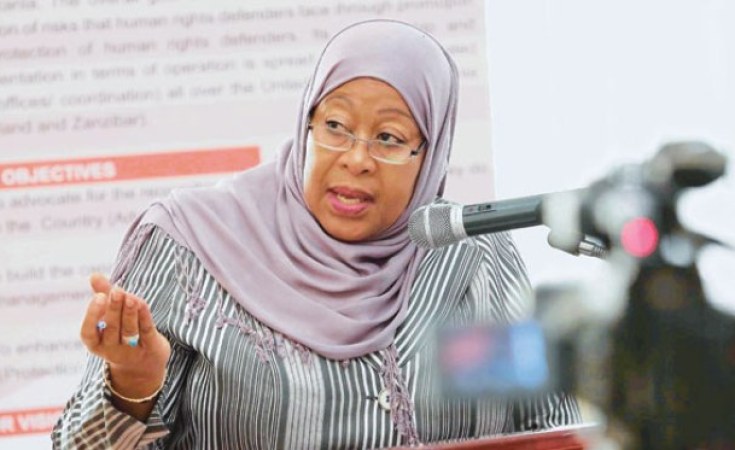Tanzania's president has ended a ban on opposition rallies imposed by her autocratic predecessor, John Magufuli. The decision was cautiously welcomed as a win for democracy by human rights groups and opposition parties.
Amnesty International has welcomed the decision by Tanzanian President Samia Suluhu Hassan to lift the ban on opposition rallies imposed by her strongman predecessor, John Magufuli.
The human rights NGO has also urged Tanzanian authorities to go further and "work towards greater protection of human rights."
At the meeting with political party representatives on Tuesday, Suluhu unexpectedly announced that opposition groups could now hold meetings, adding that it was the government's duty to "give permission and provide security."
The ban was introduced in 2016 by Magufuli at at the beginning of his first term in office, which was characterized by hard-line policies and draconian laws. Magufuli came to power in 2015 after presenting himself as a no-nonsense man of the people.
During his rule, he frequently curtailed political freedoms, earning himself the nickname "Bulldozer" for his refusal to brook any dissent. Prior to Magufuli's tenure as president, Tanzania was often cited as a beacon of democracy in East Africa.
President under pressure
Since being sworn in as president following the death of Magufuli in 2021, Suluhu Hassan -- a ruling party stalwart herself -- has been under pressure to break with her predecessor's hard-line policies.
These hopes were initially dimmed following the arrest of opposition leader Freeman Mbowe in July 2021 as he was preparing to discuss constitutional reforms at a meeting. At the time, Suluhu Hassan said she had no jurisdiction to intervene in the matter.
Tanzania's first female president has frequently battled division within her Chama Cha Mapinduzi party, shuffling her Cabinet three times in 2022 and suspending a party-owned newspaper for falsely claiming that she did not intend to run in the 2025 general election.
During her tenure as leader, Suluhu Hassan has also reached out to rivals, reopened banned media outlets and reversed some of Magufuli's most controversial policies.
Too little, too late?
Despite the recent efforts, observers say much more still needs to be done to repair Tanzania's battered reputation.
Bullet Rulinda, a political analyst and lecturer at the Open University in Dar es Salaam, told DW that Suluhu Hassan's decision to drop the ban on opposition meetings might have been the result of both external and internal pressure.
"Lifting the ban was long overdue and was unavoidable," Rulinda said.
"There was neither legal basis nor constitutional backup to block opposition parties from holding meetings," Rulinda added.
Rulinda also surmised that Tanzania's status as a signatory to international conventions on human rights ultimately forced Hassan to "free political space."
"President Suluhu should definitely go beyond this announcement. There has to be concrete action to restore a fair democratic playing field in Tanzania," Oryem Nyeko, a researcher on Tanzania for Human Rights Watch, told Agence France-Presse.
In a series of tweets, both the US embassy and the EU delegation in Tanzania also welcomed the lifting of the ban on political gatherings.
'Constructive criticism' allowed
Suluhu Hassan cautioned politicians to only engage in constructive criticism.
"I don't refer to you as opposition parties but parties that show us where the challenges are while developing the country," Hassan said.
Zitto Kabwe, the leader of the opposition Alliance for Change and Transparency party, still hailed the decision as a significant first step toward greater political reforms.
"I am exhilarated! This is the right that was snatched by the state through an illegal presidential decree. President Samia has cleaned up the mess. It is a normal thing, but Huge," he told reporters via a WhatsApp message on Tuesday.
The main opposition party, Chadema, cautiously welcomed the development. Its leader Freeman Mbowe -- who spent seven months in prison under Suluhu Hassan on terrorism charges which were eventually dropped -- said only time will tell how the new policy will be put into practise.
"It is good that the president has allowed political meetings, but we are now waiting to see the implementation by other government officials," Mbowe told reporters.
Hopes of reconciliation
Suluhu Hassan also said she was committed to "reconciliation and reforms," including a long-awaited rewriting of the constitution -- a key opposition demand.
"More legal reforms are coming soon to ensure that the rights of all parties are accommodated," she said.
Amnesty International called her comments "a welcome step in the right direction".
"We urge Tanzanian authorities to go further and work towards greater protection of human rights, including by repealing or amending the Political Parties act to remove all obstacles to rights to freedom of peaceful assembly, association, and expression," said Amnesty's regional researcher Roland Ebole.
Edited by: Ineke Mules


